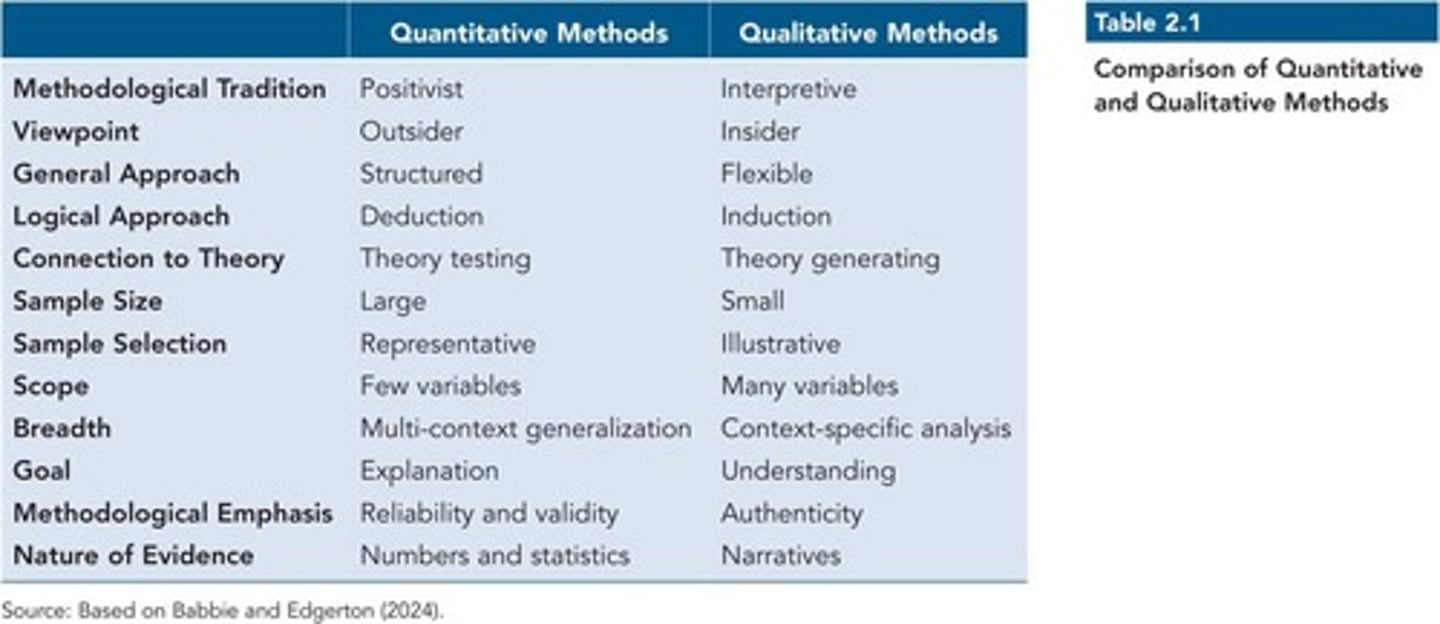Introduction to Sociological Research: Methods, Bias, and Ethics
1/44
There's no tags or description
Looks like no tags are added yet.
Name | Mastery | Learn | Test | Matching | Spaced |
|---|
No study sessions yet.
45 Terms
What is the difference between scientific and unscientific thinking?
Scientific thinking relies on systematic observations and evidence, while unscientific thinking may rely on casual observation, tradition, or authority.
What is bias in the context of sociological research?
Bias is the systematic tendency to reach a certain type of conclusion or judgment, which can lead to incorrect observations.
What are some common errors in inquiry?
Common errors include overgeneralization, selective observation, and illogical reasoning.
What is overgeneralization error?
It occurs when exceptions are treated as the rule.
What is selective observation?
It occurs when evidence that contradicts firmly held beliefs is ignored in favor of confirming evidence.
What is illogical reasoning in sociological research?
It is the expectation of the recurrence of events without reasonable cause.
What is pseudoscience?
Pseudoscience involves claims that sound scientific but do not adhere to the scientific method, often relying on anecdotal evidence.
What are Barnum statements?
Barnum statements are vague and general statements that could apply to many people, often used in psychic claims.
What are the hallmarks of pseudoscience?
Hallmarks include reliance on anecdotal evidence, refusal to abandon disproven theories, and selective observation.
What ethical principles are important in sociological research?
Key ethical principles include voluntary participation, harm minimization, right to privacy, and authenticity.
What is the interpretivist tradition in sociological research?
The interpretivist tradition views social realities as subjectively constructed and is best studied through qualitative methods.
What is the positivist tradition in sociological research?
The positivist tradition views social realities as objective and is best studied through quantitative methods, often using surveys and statistics.
What is deductive reasoning in research?
Deductive reasoning begins with general ideas and tests their validity on specific cases.
What role does peer review play in sociological research?
Peer review ensures the validity and reliability of research findings through evaluation by other experts in the field.
How has the COVID-19 pandemic influenced perceptions of pseudoscience?
The pandemic has led to a significant increase in awareness and interest in pseudoscience, particularly through mass and social media.
What percentage of North Americans believe in the powers of psychics and mediums?
About 40% of North Americans believe that psychics' and mediums' powers are real.
What is the significance of online medical advice according to recent studies?
Online medical advice can empower patients but also carries risks of misinformation and adverse reactions.
What is the importance of careful sampling in sociological research?
Careful sampling ensures that research findings are representative of the larger population, enhancing the validity of the study.
What is the role of replication in sociological research?
Replication involves repeating studies to confirm findings and ensure reliability.
What is the relationship between societal prosperity and religiosity?
Research indicates that as societies prosper, they tend to become more secular, with lower rates of religiosity.
What is the significance of authenticity in research ethics?
Authenticity ensures that research findings accurately represent the subjects and contexts being studied.
What happens to religiosity as societies become more prosperous?
They become more secular (non-religious).
What is the focus of quantitative research methods?
They emphasize quantitative methods and deductive reasoning.

What is deductive reasoning?
It begins with general ideas and tests their validity on specific cases.
What is the interpretivist approach in research?
It emphasizes qualitative methods and inductive reasoning.
What is inductive reasoning?
It begins with concrete cases and identifies general patterns and themes.
What is an experiment in quantitative research?
A carefully controlled artificial situation that isolates hypothesized causes and measures their effects.
What are surveys in quantitative research?
They ask people questions about their knowledge, attitudes, or behavior through various formats.
What is an independent variable?
The presumed cause in a cause-and-effect relationship.
What is a dependent variable?
The presumed effect in a cause-and-effect relationship.
What is a control variable?
It identifies the context of the relationship between an independent variable and a dependent variable.
What is spuriousness in research?
It occurs when a change in a control variable causes changes in both the independent and dependent variables, erasing their association.
What does validity refer to in research?
The degree to which results reflect reality and measure what they are intended to measure.
What does reliability refer to in research?
The degree to which a measurement procedure yields consistent results.
What is the goal of qualitative research?
To achieve a subjective understanding of social phenomena using the inductive approach.
What is participant observation in qualitative research?
Researchers take part in the social group being studied while systematically observing what occurs.
What is reactivity in qualitative research?
It occurs when the presence of a researcher causes observed people to conceal certain things or act artificially.
What are structured interviews?
Interviews that follow carefully crafted protocols to acquire respondents' views on predetermined subjects.
What are unstructured and semi-structured interviews?
Interviews that employ loose, open-ended formats, allowing respondents to answer in their own words.
What is exploratory research?
Research that seeks to formulate theories about a subject of interest, often used for sensitive topics.
What is a focus group in qualitative research?
Group interviews where a small number of individuals discuss a specific issue under a moderator's guidance.
What is authenticity in qualitative research?
The extent to which qualitative investigation captures social realities as experienced by insiders.
What is digital sociology?
The study of digital technology as both a tool and subject of research.
What are nonreactive methods in research?
Methods that involve studying social life without affecting the behavior of the people involved.
What did the study by Bruch and Newman (2018) analyze?
Messages on a popular heterosexual dating app to investigate desirability rankings.